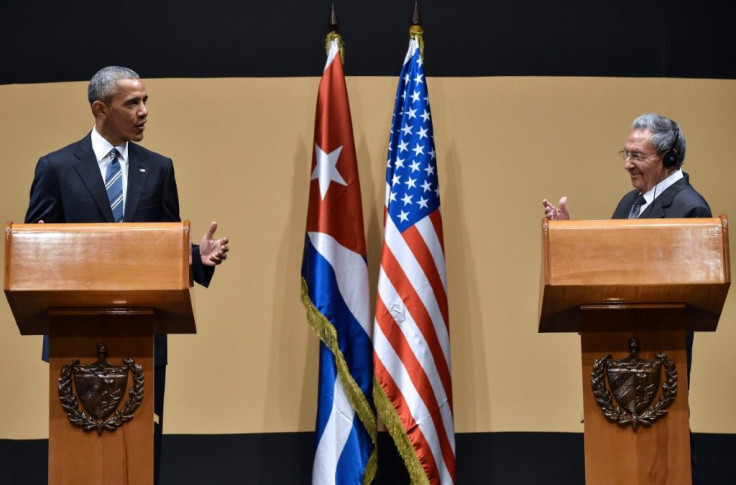US-Cuba Relations: From Sudden Warming To Icy Plunge

Cold War enemies for more than five decades, Cuba and the United States dramatically improved their ties in 2014 before an icy reversal under President Donald Trump five years ago.
Here is a recap.
On December 17, 2014, US President Barack Obama and his Cuban counterpart Raul Castro agree to revive diplomatic ties suspended since 1961.
The breakthrough follows 18 months of secret talks mediated by the Vatican and Canada.
"We are all Americans," Obama declares in Spanish.
In January 2015 Washington decides to ease travel and trade restrictions with Cuba that are part of a five-decade US trade embargo.
The next month a direct telephone link is restored.
In April Obama and Castro hold face-to-face talks in Panama, the first between leaders of the nations since Cuba's 1959 communist revolution.
Washington strikes Cuba off its list of countries supporting terrorism.
In July they reopen their respective embassies.
In March 2016 Obama becomes the first US president in 88 years to visit Cuba, hailing a "new day" in relations.
Six months after taking office, Trump in June 2017 announces he is "canceling the last administration's completely one-sided deal with Cuba".
He promises to instead support the Cuban people against their "cruel and brutal" regime.
Rules are reimposed to restrict American travel to Cuba, and US ties to a military-run Cuban tourism firm are banned. The trade embargo is reaffirmed.
In August reports emerge of US embassy staff in Cuba suffering mysterious hearing loss, ear pain and dizziness.
Officials claim they may have been attacked with a sonic device. Cuba denies any involvement.
In September 2017 Washington withdraws more than half the personnel from the embassy. In October it expels 15 Cuban diplomats.
In January 2019 Castro hits out at the US government's return to "confrontation with Cuba".
In March Washington slashes the length of visas for Cubans.
It imposes sanctions on four shipping companies and nine tankers for transporting to Cuba oil from Venezuela, the island's main supplier.
In April 2019 the United States gives the green light for Cuban exiles to use US courts to sue private companies and the Havana government for profiting from properties nationalized after the revolution. About 20 complaints have been lodged.
Washington also bars Americans from travelling to Cuba, except to visit family, and limits remittances.
Later that month Trump tells Cuba to stop supporting the Venezuelan government, with which Washington is in dispute, or a face a "full and complete embargo, together with highest-level sanctions".
In June 2019 Washington bans group educational travel to Cuba. It also outlaws US exports of boats and private airplanes.
It goes on to sanction Cuba's state-run oil firm and limit money transfers, seeking to starve it of foreign currency.
The country begins to experience fuel shortages and blackouts that President Miguel Diaz-Canel in September blames on the US sanctions.
Products like soap and cigarettes are also in short supply.
In October the US targets Cuba's vital tourism industry by tightening the ability of its airlines to lease aircraft.
© Copyright AFP 2024. All rights reserved.




















